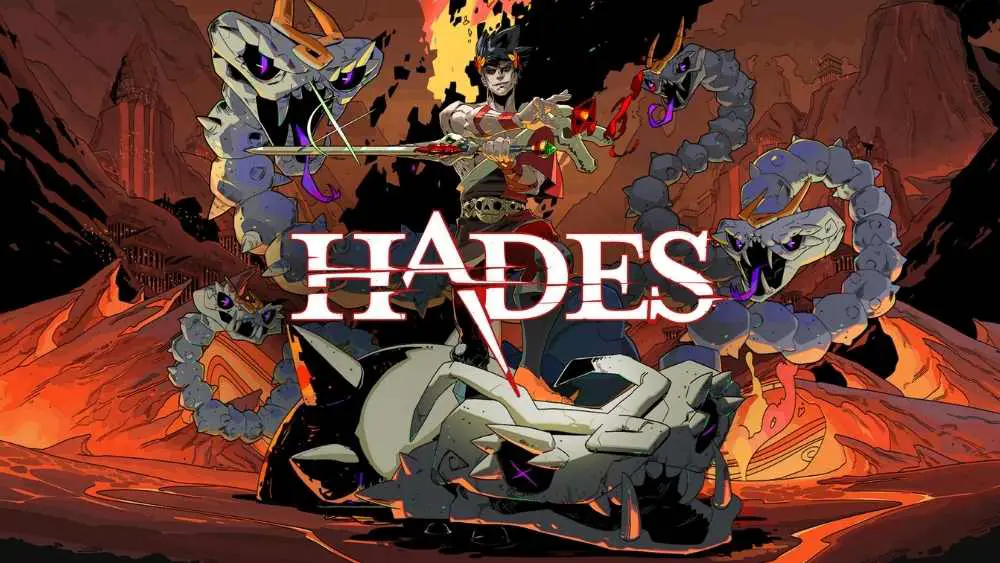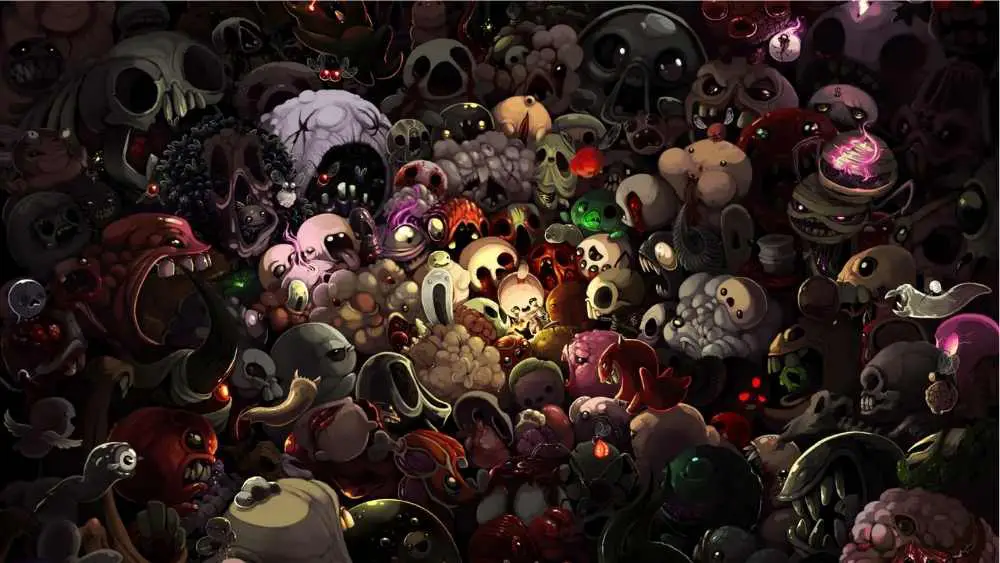I’d like to think that there are some of you out there who vaguely remember the dawn of the flash games – games like N, Bloons TD and Canabalt. That was a different time for games, and as we kids went from computer to computer in our school to install these flash games on all computers, we could. The Binding of Isaac was one such title, although the version we get now is no longer made in Flash and has far more content and depth than before.
Related read: 15 Games Like For the King
Games like The Binding of Isaac are called roguelikes. The basic concept is unlike the mainstream games we play today, there is no option to save mid-game, and there are no retries. Death is permanent.
The Binding of Isaac starts with a boy being chased by his mother with a knife, turns out “God” asked her to sacrifice her child. Isaac hides in the basement, where he’s teleported to a different world as he tries to escape his ill fate.
Games like The Binding Of Isaac don’t really explain much and leave the player to their own devices; how you figure out the game is left entirely up to you. BoI features randomly generated worlds with random items filling the said world. Some items are really good; some items are really bad and can screw up a good run. The items will have an obscure name that throws players even more off as to what the items can do. The only way to know for sure in this game is trial and error.
If you had a fun time with BoI or are just curious and looking for an easier title in the genre, look no further. Here are 9 games like The Binding Of Isaac.
1. Hades

Hades is a beautiful rogue-lite title, with everything being top-notch. Graphics, Music, Combat, Balancing – everything is as polished as it could be. All of this with an experience that is easier than BoI but just as rewarding once you beat the game.
Hades puts players in Zagreus’ shoes, the son of Hades – God of the Underworld. Zagreus must traverse all levels of hell (quite literally) starting from the bottom and work his way to the top to meet his estranged mother.
Hades is not a roguelike per se, it’s a rogue-lite. The difference being while you lose progress once you die, you do carry over some currency among other things that can benefit you in your next run, as such you become stronger per run.
I have over 100 hours on this game, there is plenty to do, once you finish the main quest (which btw is beautifully written) there are also side quests where you can help the poor unwitting dead souls residing in your father’s empire.
Hades has a great combat and gameplay loop, people who get frustrated from dying in BoI should look to Hades to have a more enjoyable rogue-lite if not roguelike experience.
2. Super Meat Boy

BoI is not the only flash game that evolved to something bigger, Super Meat Boy is more platformer than rogue but since their treatment of death is almost similar (instead of resetting your entire progress, the entire level is reset a la Mario or Sonic) and they both come from the era of flash titles, I think Super Meat Boy deserves a spot in the list.
However, I won’t be recommending it to people who got frustrated with BoI’s difficulty, in fact, I’d recommend it to the exact opposite crowd, those who want more of the pleasure in pain. Super Meat Boy is a platformer that will pit you against impossible to navigate through environments filled to the brim with traps, but that’s not to say that it’s impossible to beat.
SMB is perhaps the only platformer I’ve played that allows such tight and precise control of the character allowing easy navigation through traps that would have been tougher in a game like Mario or Sonic, where controls almost seem a bit delayed.
SMB is punishing, sure, but it doesn’t let you wallow in your mistakes. As soon as the player dies they are respawned to the start of the level almost instantly, allowing players no time to rage, only giving them a chance to learn from their mistake and proceed further wasting no time.
3. Dead Cells

After the success of Dark Souls, a slew of games came out to capitalise on its then niche genre of tiringly difficult games. Dead cells is one of the better ones bringing enough new things that it demands to be regarded as more than just Souls-like.
Although Dead Cells is a rogue-lite first and foremost it also carries over some Metroid vibes for exploration. As the player goes run after run they accumulate currency and blueprints that can be used to make subsequent runs “easier” (I use the term lightly because nothing becomes easier, only the player can progress farther than the last time).
Dead Cells is a punishing game, and if I were to rate its difficulty in this list I’d say it’s the hardest so far.
4. Rogue Legacy

Rogue Legacy is another platformer rogue-lite. It is very similar to dead cells in its gameplay loop – Begin with nothing, go into the procedurally generated world, collect loot and blueprints, die, repeat.
After each run, you are allowed to invest what you earned in a skill tree that will assist you in subsequent runs. Where it arguably makes a better experience than Dead Cells is that runs are short, very short. Where one run in dead cells can easily go over an hour, Rogue Legacy runs can range from anything between 5 minutes or 30. This short-run type of experience allows you to progress your skill tree faster, making for more satisfying and rewarding gameplay without the essential grind found in Dead Cells.
5. Don’t Starve

I remember discussing this title in my comparison with 7 Days to Die, and while those relations weren’t unfounded in the form of great survival mechanics, Don’t Starve is also a roguelike title.
Players are thrown into a procedurally generated world with no items or help, they must ensure they stay in the light to keep their insanity intact, and of course, as the game’s name suggests, don’t starve.
Don’t starve has a unique 2/2.5-D aesthetic that conveys a sense of isolation in the world, as the player alone must traverse the land finding food and resources for their base as they get better equipment and fight more monsters that come their way.
There is an end-goal that I won’t spoil here and is better players come across this by themselves.
Oh, by the way, death is permanent. (Why wouldn’t it be?)
6. FTL: Faster Than Light

Faster Than Light is perhaps the oddest one out of the bunch, it’s a mix of roguelike and the RTS genre set in space.
Players are in control of a ship and their objective is to outrun the bad guys, on the way, there will be many encounters, with stranded civilians or threatening pirates.
The beauty of FTL lies in the ability to choose your path, however, it’s not advisable to avoid all combat because destroying a ship allows the player to salvage it for resources, money, ammo etc.
The combat is not as simple as it seems at first glance. Players must deploy strategic use of their weaponry on different compartments on the opponent’s ship. For example, you can target their shield compartment doing considerable damage to it will result in your opponent losing shields till they repair that room. The same goes for the player, as the AI will attempt to target the oxygen room it is up to the player to get it repaired and running before the entire crew suffocate.
This is a more laidback take on both roguelike and RTS genres allowing players to pause mid-battle to give commands etc. Laidback doesn’t mean easy though, and as such requires gamers to use their most important muscle to win the game.
7. Enter the Gungeon

Enter the Gungeon is the middle ground between Hotline Miami and BoI. Essentially, it’s an amalgamation of roguelikes and bullet hells.
Enter the Gungeon features a weird but satisfying aesthetic where everything you see will have something to do with guns, more specifically bullets. Most if not all enemies are bullet-shaped and holding a gun, which is kind of funny in its own right.
The items in this game are something as simple as a high powered magnum to a fire-spewing pitchfork that shoots fireballs, and that is what honestly appeals to me the most about this game.
If you’re a bullet hell veteran looking for a slightly different take on the genre, Enter the Gungeon is for you.
8. Risk of Rain

Risk of Rain is one of those games that players will have a better time playing together than as a solo experience.
Risk of Rain is a rogue-lite platformer in an alien world. As the player starts and grasps the mechanics of the game they will go from a squishy one-hit-kill character to a literal God as they progress. But that’s not exclusive to the player’s character. The unique aspect of this game is that the enemy AI also progressively becomes harder the longer you survive, emphasizing the need to be fast, or at least faster than you were in your previous attempt.
9. Hotline Miami

Hotline is perhaps an odder title to look at than Don’t Starve, as it is neither a roguelike or lite. Where Hotline is similar to BoI is aesthetics and a confusing but more in focus lore. If BoI is Counter-Strike then Hotline is Doom.
Hotline Miami sees the player as a killer for hire as he dons various masks that give him abilities (ability to dual-wield weapons, or one hit punch) and goes on a rampage that makes no sense until the very end.
While Hotline gives players enough arsenal to defeat a small army (which you will be doing constantly) it’s no easy feat, seeing as the player has almost the same HP bar as the enemies, one shotgun from 5 feet away is enough to put you down, respawning you to the beginning of the level. Ready to rampage again.
Roguelike games have been my favorite genre due to their sheer replayability and sense of accomplishment. That is lacking in the current AAA titles which are basically glorified movies when compared to the depth and intricacies of most games in the roguelike genre.
Unlike Skyrim or The Last of Us, Binding of Isaac doesn’t give you a quest marker or objective list. It doesn’t tell you that this item is important for winning (not like any such item exists in BoI), instead, roguelikes leave us in the middle of the beach with a shovel and ask us to build a sandcastle, doesn’t matter how big or beautiful, just try to build it, and as the waves come to shore and take away your progress, we keep trying, until we beat it.
Beating the main boss in Binding of Isaac was honestly more satisfying to me than “beating” Alduin at the end of Skyrim. While BoI didn’t let me rely on anything except what I’d learnt in a sweaty pursuit for victory I finally did it.
Whereas, in Skyrim, I stood with 3 heroes who couldn’t die as I lazily pressed “Z” to shout at the end boss who would land close-by and the 3 heroes would jump at him while I just waited, tired waiting to press “Z” again.
Want to find out similar suggestions for other games as well? Visit our Games Like hub.

